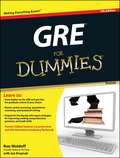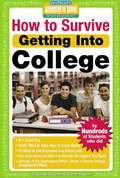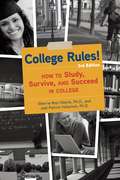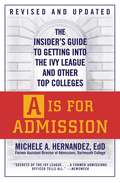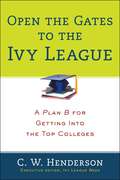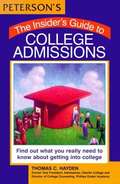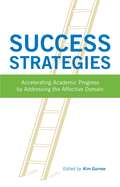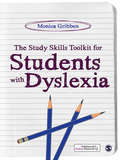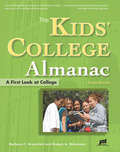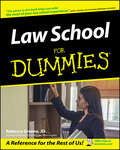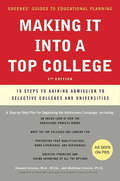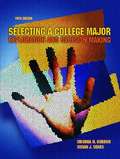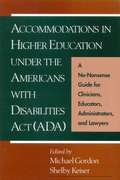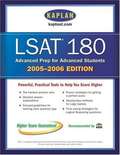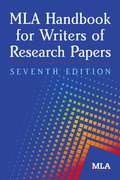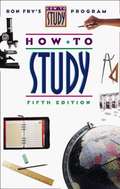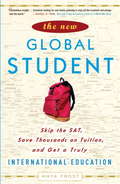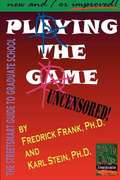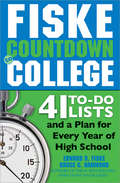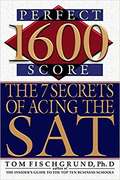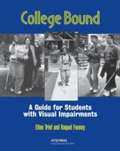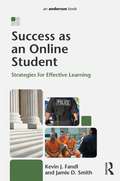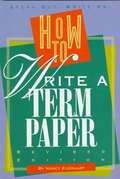Special Collections
Student Resources
- Table View
- List View
GRE For Dummies, Premier 7th Edition
by Joe Kraynak and Ron WoldoffA complete guide to score your highest on the GRE--now with a bonus CD-ROMThe Education Testing Service announced recently that changes to the 2011 GRE test are the most significant updates to the exam to date. The new computer-based test is intended to measure skills that are truly critical to performing well in graduate or business school. GRE For Dummies, Premier 7th Edition with CD-ROM, provides students with an updated study guide for the redesigned GRE, as well as multiple practice tests, including additional content and two additional practice tests on the CD-ROM that are not available in the standard edition of the book. The information included in this revised and expanded Premier edition prepares readers to achieve their maximum score on this challenging exam.Here, you'll get an updated study guide for the newly configured GRE test and three tests that model real GRE questions, plus two additional tests on the CD-ROM. It covers all the sections you'll encounter on the actual exam--verbal reasoning, quantitative reasoning, and analytical writing.An updated test prep guide to the GREStrategies for all the question types on the 2011 examTwo fully revised practice tests and one brand new practice test plus two additional timed tests on the CD-ROM--for a total of 5 practice testsHundreds of practice questions with detailed explanations and walk-throughsEverything you need to know to conquer the three sections of the exam--verbal reasoning, quantitative reasoning, and analytical writing500 vocabulary terms most likely to appear on the test, plus 300 vocabulary flashcards on the CD-ROMWith clear, straight-forward advice and written in an approachable, easy-to-understand manner, GRE For Dummies, Premier 7th Edition with CD-ROM is your ticket to scoring your highest on the new GRE.
How to Survive Getting into College
by Rachel KornHundreds of students share their hard-won wisdom, thoughts, strategies, struggles, and even failures. Filled with tips, tricks, humor, and horror stories, as well as practical advice on applications, interviews, and financial aid, the book is a lifeline for high school juniors and seniors.
Reducing Barriers to Training of Blind Graduate Students in Psychology
by Heidi JoshiTo increase the number of psychologists with visual impairments, all levels of the pipeline, from graduate training through practica and internship, need to be accessible to this population. This study sought to determine the types of barriers students who are blind face in their psychology graduate programs. The areas explored in the study included accessing printed materials throughout participants graduate process, administering and scoring test protocols, accessing sources for research, and obtaining campus-wide communications. Attitudinal barriers were also explored in this study, particularly from supervisors, instructors, and peers. There is very little research in this area and as a result, this study was designed to elucidate the experiences of participants with visual impairments in their graduate programs. One goal was to give training institutions a better understanding of the barriers faced by students who are blind. Nineteen participants were interviewed using a semi-structured questionnaire consisting of yes/no and open-ended questions. Descriptive statistics were utilized in order to obtain the major themes of the responses. The most universal barrier related to the plethora of printed material encountered in graduate training. Nearly all of the participants discussed difficulties in obtaining printed material in alternate formats. They especially found it difficult to get enough sources in a timely manner for their research. Participants discussed missing class changes or other important details due to this information being posted in print and not accessible to them. Attitudes were a second barrier frequently encountered. Participants stated that they had to contend with the prejudicial attitudes of supervisors, professors, and peers who were meant to assist them in their process. Participants also discussed their wish to have more disability related awareness and education activities implemented in the curriculum of their graduate institutions. This would assist these institutions in overcoming the attitudinal barriers experienced by their students who were blind. However, participants also discussed supportive factors such as partners and professors who would provide appropriate classroom accommodations. Despite the over thirty years since passage of the rehabilitation act, and the fourteen years since the implementation of the American with Disabilities Act. Results indicate that numerous barriers still exist for graduate psychology students who are blind. These barriers must be aggressively addressed for persons who are blind to be afforded equal access to training in psychology.
The ABC's of College Planning
by Bernice HornchakThis book is a service project of the New Jersey Association for College Admission Counseling. Its chapters draw on the collective knowledge, experience and expertise of admission and guidance professionals who have helped thousands of high school students make a successful transition to college.
College Rules!, 3rd Edition
by Jodi Patrick Holschuh and Sherrie Nist-OlejnikAnd You Thought Getting into College Was Hard... Students who assume they can figure out college on the fly often learn things the hard way--they look back and think, "If only I'd known this from the start!" College Rules! will save you the time and trouble, setting you up for academic success from the get-go. Lesson #1: College is different from high school, and even those who were at the top of their class will need practical advice on how to successfully transition to college life. This updated and expanded third edition of College Rules! reveals strategies that aren't taught in lectures, including how to: Study smarter--not harderPlan a manageable course scheduleMaster e-learning technologiesInteract effectively with profsBecome a research pro--at the library and onlineOrganize killer study groupsFeel engaged--even in "yawn" coursesSurvive the stresses of exam weekSucceed even as an alternative or adult studentSet yourself up for stellar recommendations Saving time, energy, and aggravation by doing everything right the first time will free you up for that pizza break, ultimate frisbee game, or ski trip even quicker. Why? Because College Rules!
A is for Admission
by Michele A. HernandezFor generations, the admissions process of the Ivy League schools has been cloaked in mystery and myth. Now, a former admissions officer at Dartmouth College reveals how the most selective schools make their decisions.
Open the Gates to the Ivy League
by C. W. HendersonThe only guide to college admissions that offers an alternative gateway to getting into the USA's top-rated schools. Ivy League schools on average reject about 90 percent of applicants. But there is another way to gain admittance to the top colleges in the U. S. -a back gateway. This guide is a Plan B that uncovers alternative, and often less expensive, ways for getting into the eight universities of the Ivy League proper, as well as the so-called second tier. Some of these back gateways are virtually unknown and all but secret, while others are just under used.
The Insider's Guide to College Admissions
by Thomas C. HaydenThis is a guide to the admission process from a college admissions director. What really goes on in admissions committee meetings?
Success Strategies
by Kim GurneeThe book presents fourteen success strategies in a concise format and helps students cultivate the mindset that focuses on growth.
The Study Skills Toolkit for Students with Dyslexia
by Monica Gribben'This toolkit is the student's safety net offering user friendly, down to earth advice and real life skills that have been tried and tested by the author'-Dr John Schneider, Educational Psychologist, Edinburgh 'This is exactly how I felt starting university ... a wonderful and very helpful book full of interesting and useful hints and tips on how to survive university as a dyslexic student. It doesn't make you feel silly or stupid but makes you feel you can achieve what you set out to do'-Sharon Patterson, Adult Nursing student, Edinburgh Napier University 'You realize you're in the hands of a professional who has taught thousands of students how to succeed at university'-Holly Pellicer, Dyslexia Advisor, University of Oslo Packed with helpful advice, checklists and templates, this book will help you improve your study skills throughout your time at university. Written in a straightforward, no- nonsense style, the guidance can be broken down into manageable chunks. Issues covered include: - procrastination - planning your assignment - understanding your essay question - researching, writing and referencing your written work - managing your own well-being. Drawing on years of experience running study skills workshops in higher education, Monica Gribben has written an accessible book for students with dyslexia that shows how to work through the challenges that studying presents. The companion Website www.sagepub.co.uk/gribben has podcasts, worksheets and electronic resources to support each chapter. Monica Gribben is a private dyslexia consultant and Dyslexia Adviser at Edinburgh Napier University.
The Kids' College Almanac
by Barbara C. Greenfield and Robert A. WeinsteinA fun and interesting way for middle school students to get their first information about college and how it's a possible and worthwhile goal to pursue. Starts with the basics and gives a comprehensive overview of everything the student can expect when exploring college--all in bite-sized pieces.
Law School For Dummies
by Rebecca Fae GreeneThe straightforward guide to surviving and thriving in law school Every year more than 40,000 students enter law school and at any given moment there are over 125,000 law school students in the United States. Law school's highly pressurized, super-competitive atmosphere often leaves students stressed out and confused, especially in their first year. Balancing life and schoolwork, passing the bar, and landing a job are challenges that students often need help facing. In Law School For Dummies, former law school student Rebecca Fae Greene uses straight talk, sound advice, and gentle humor to help students sort through the swamp of coursework and focus on what's important-all while maintaining a life. She also offers rare insight on the law school experience for women, minorities, non-traditional, and non-Ivy League students.
Making It into a Top College
by Matthew W. Greene and Howard GreeneLet America's premier college consultants take the mystery out of admissions. As seen on PBS, this proven, ten-step program offers a comprehensive inside view of the state of college admissions today. Educational consultants Howard and Matthew Greene have mastered the science and art of college admissions, helping tens of thousands of students get into their schools of choice. This highly effective program is now available to all students who want to attend an outstanding college or university. The Greenes' cutting-edge approach will teach you to: Think like an admissions officer Plan a comprehensive admissions campaign Understand and take advantage of current trends Implement the best strategies for standing out Whether it's choosing the best college for you, writing a winning personal statement, or planning your college financing, this fully updated new edition gives you the latest in admissions secrets, statistics, tactics, and facts.
Selecting A College Major
by Virginia N. Gordon and Susan J. SearsThis innovative text simplifies the process of choosing a major from a sometimes overwhelming array of majors and related career fields. It will assist not only the "undecided" student with selecting a major, but also the "major-changer" who is exploring alternative options. A step-by-step process leads students through personal and academic assessment as well as occupational information searches. Through thought-provoking activities, they can explore their academic, career, and personal interests and goals. Students can investigate academic majors from many perspectives, including a search of majors in general, majors on their campus, and majors based on their academic and occupational interests. Highlights of this text include: *A Natural Decision-Making Progression. Students are directly and personally involved in activities that involve exploration, reflection, and choice. *Extensive Major Exploration. Three distinct approaches help students narrow their list to realistic alternatives. *Incorporation of Academic and Career Interests, Abilities, and Values. Self-assessment gives students information on which to base their choice of a major. *Formulation of a Graduation Plan. Students use their academic transcripts to summarize all they have learned and develop a plan for the future. Features include: *Majors Exploration *Career Advice *Web Links *Tips from Successful Students *Student Bulletin Boards *Faculty Resources
Accommodations in Higher Education under the Americans with Disabilities Act
by Michael Gordon and Shelby Keiser and Alta LapointThis manual outlines how the ADA applies to a wide range of mental and physical impairments within higher education settings, it outlines a series of fundamental principles and actual clinical/administrative procedure
LSAT 180
by Eric GoodmanThe challenging practice and proven strategies you need to get a perfect score on the LSAT. This advanced guide includes: the toughest questions, the most effective logic games tactics, powerful reading comprehension strategies, top scoring logical reasoning techniques
MLA Handbook for Writers of Research Papers (7th edition)
by Joseph GibaldiThe seventh edition of the MLA Handbook is a comprehensive, up-to-date guide to research and writing in the online environment. It provides an authoritative update of MLA documentation style.
How to Study (5th edition)
by Ron FryHow to Study has gained immense popularity among students of all ages for one simple reason: It works. Now updated and expanded for the information age, this "A-plus" read includes how to create a work environment, excel in class, use the library, do research online, and much more.
The New Global Student
by Maya FrostGood-bye, Old School. Hello, Bold School!In 2005, Maya Frost and her husband sold everything and left their suburban American lifestyle behind in order to have an adventure abroad. The tricky part: they had to shepherd their four teenage daughters through high school and into college. This hilarious and conspiratorial how-to handbook describes the affordable, accessible, and stunningly advantageous options they stumbled upon that any American student can leverage to get an outrageously relevant global education. Ready to ditch the drama of the traditional hypercompetitive SAT/AP/GPA path? Meet the bold American students who are catapulting into the global economy at twenty with a red-hot college diploma, sizzling 21st-century skills, a blazing sense of direction–and no debt. You’ll discover: • the one thing preventing your student from blasting forward• why Advanced Placement isn’t so advanced• why international programs fail to provide a truly global education• the most critical time for your student to study abroad• the best exchange program in the world ($3,000 or less per year)• the strategic way to fast-forward through high school• how to maximize a family sabbatical • how to live the life of your dreams abroad–and save thousands for collegePacked with myth-busting facts, laughable loopholes, insider insights, astonishing success stories, and poignant tales from the Frost daughters themselves, this inspiring romp is guaranteed to get you cheering.
Fiske Countdown to College
by Edward B. Fiske and Bruce G. HammondUnique, simple approach to the complicated college prep process, from the leading authority in college admissions.
1600 Perfect Score
by Tom FischgrundThe author describes the seven qualities that make students who achieve a perfect SAT score stand out. He bases these claims on interviews with students, responses from parents, and College Board data. During his research, Fischgrund asked students about how much time they spend working, reading, watching TV, etc. His conclusions support some of the commonly-accepted thinking about what makes a teen "smart," but he disproves many beliefs as well.
College Bound
by Ellen Trief and Raquel FeeneyThis book provides an essential reference source, serving as both a step-by-step guide for students to use independently and a much-needed text for educators to use to prepare students with visual impairments and blindness for success in college. It is organized into sections that can be read and worked on independently in whatever sequence best meets the student's needs. Appendixes contain charts that can be reproduced, resources for further information, and sources of products and materials.
Success as an Online Student
by Kevin J. Fandl and Jamie D. SmithThis book presents concise guidance to make the online learning journey enjoyable, productive, and most of all, worthwhile.
How to Write a Term Paper
by Nancy EverhartDescribes the steps in writing a term paper, including choosing a topic, doing research, writing an outline, taking notes, doing a rough draft, and editing the final paper.
